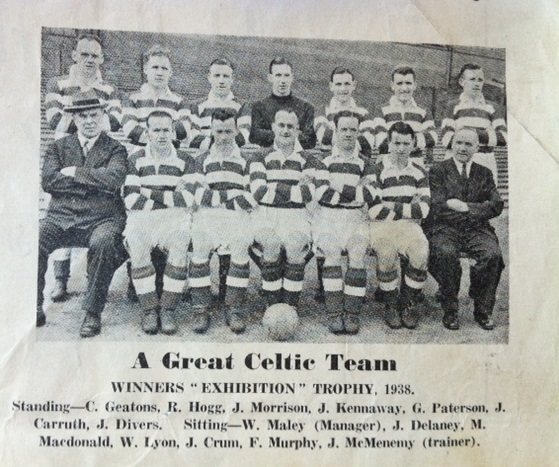And they gave us James McGrory…and Jackie Watters
Funny how things happen sometimes.
Following the publication of my Copenhagen Diary on the Celtic Star last week, one of the responses I received was from an old pal who had been mentioned in the story. He wanted to show me a couple of photographs, containing Celtic autographs of the past, which had been in his possession for years.
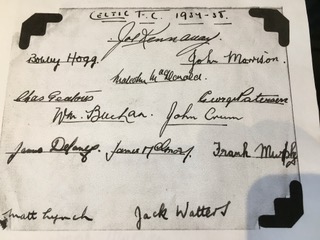

‘I inherited these. Don’t know much about them. Any ideas?’
Cheers, Paddy. For saddos like me, this is Celtic manna from heaven.
At first glance, the one at the top looked straightforward enough. The Empire Exhibition Cup-winning team of 1938. Well, not quite. On closer inspection, the team laid out in the old ‘2-3-5’ formation was not the one which triumphed at Ibrox on Saturday, 10 June 1938 by beating Everton 1-0 at Ibrox after extra-time to lift ‘the model of the tower [which]was football’s prize,’ in front of 82,000 fans.
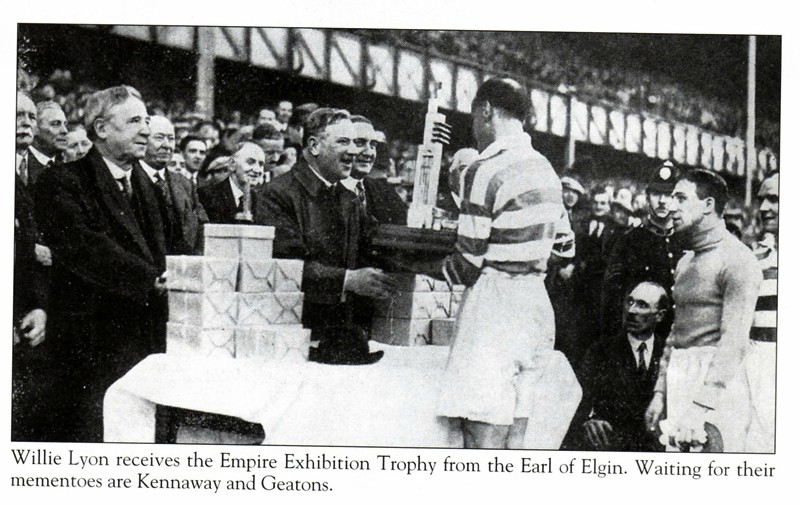
For one thing, Celtic skipper Willie Lyon, the man who lifted that trophy, the last major honour won by the Hoops under Willie Maley, was missing from the sheet, his centre-half slot bearing the signature of Malcolm MacDonald, who had played at inside-right that day in Govan. No John Divers there either.
At inside-right on the photograph was Willie Buchan’s autograph. The Grangemouth-born Buchan had become a firm fans’ favourite, since making his debut at the beginning of the 1933/34 season. He had been the ‘man-of-the-match’ in the 1937 Scottish Cup Final, setting up the early opener for Johnny Crum before scoring the winner with eighteen minutes remaining, taking a pass from Jimmy McGrory to beat Aberdeen keeper Johnstone at his near post. It was, therefore, a shock when he was sold to Blackpool a few months later, on Monday, 15 November 1937, in a £10,000 deal which was a record fee at that time for a transfer involving a Scottish club.
Two days earlier, Willie had scored Celtic’s goal from the penalty spot in the 1-1 draw with Third Lanark at Cathkin. There was no indication that he was soon to be sold, however, the player was summoned to Maley’s Bank Restaurant in Queen Street, in Glasgow’s city centre, on the Monday morning, where he was met by the managers of both clubs. The deal had been done. In the player’s own words, ‘The way things were put to me, it seemed I had no choice in the matter. It was a great disappointment to me, as I was enjoying playing for Celtic.’
The following Saturday, Celtic minus Buchan travelled to Somerset Park, Ayr for a league meeting with the local United. The versatile Malcolm MacDonald moved up to inside-right to fill the gap, with young Matt Lynch stepping into ‘Calum’s’ normal right-half role for his Hoops debut, just days short of his 21st birthday. Lynch’s name appears at the bottom of the autograph sheet, under the named eleven. Matt had already been at Parkhead for more than three years, signing from junior outfit, St Anthony’s, in August 1934.
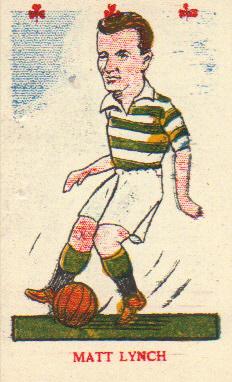
He would go on to play more than 200 games for Celtic, before moving on at the end of the 1947/48 season, a campaign where the Hoops flirted dangerously with relegation for perhaps the first and only time, a perfect hat-trick from Jock Weir at Dens Park in the final game removing the possibility of that unthinkable outcome.
For much of his early Celtic career, Matt had been used as a ‘utility man’, deputising for recognised first-choice players. The Empire Exhibition Cup of 1938 would be a case in point, Lynch standing in for injured right-winger Jimmy Delaney during the victories over Sunderland and Hearts, before making way for the Cleland-born legend in the final against Everton.
I would meet him several times as a child, in his capacity as Honorary President of the Celtic Supporters Association in the early seventies. My dad, also Matt, was in the Executive Committee of the CSA, and would point him out in the old premises at Kinloch Street, or in the Kelvin Hall for the Annual Rally.
On that November day at Somerset Park, back in 1937, Matt’s Celtic debut would end in a 1-1 draw. The Hoops goal was scored by Joe Carruth, triggering another memory of my youth. I recall being taken to his ‘holy shop’, Carruth’s Grotto, on Castle St or ‘Parly Road’, near Glasgow Cathedral, often as a kid.
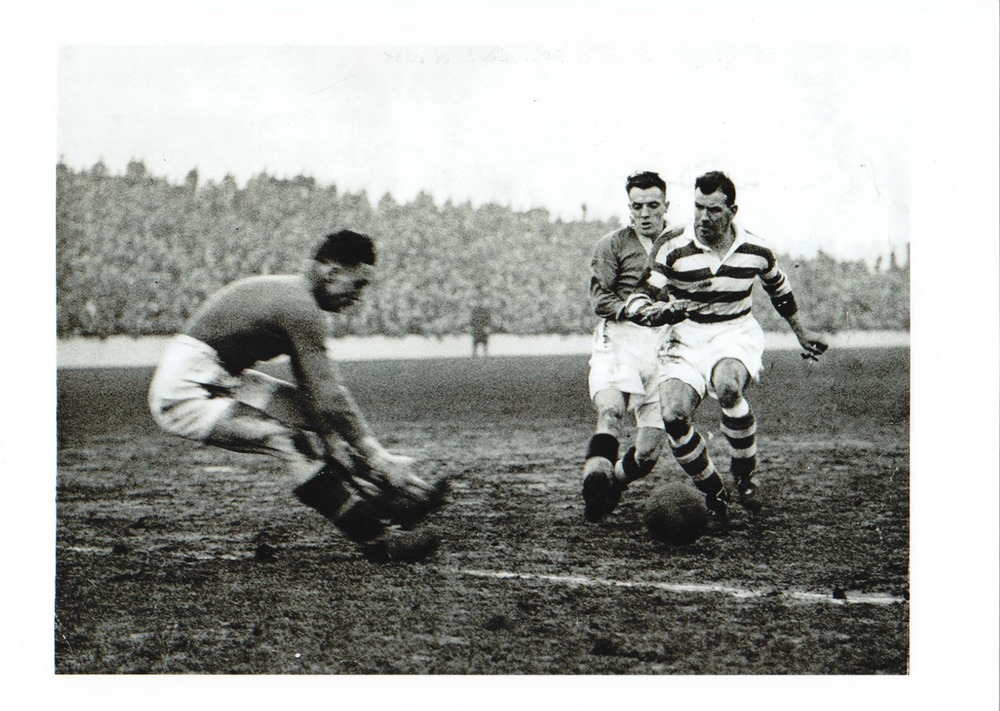
At centre-forward on the sheet was James McGrory. 1937/38 would prove to be his last one as a Celtic player, the great man struggling to shake off the injuries sustained over a magnificent career fighting for the cause, his beloved Hoops, hence the inclusion of Joe Carruth against Ayr United. Jimmy had appeared in nine of Celtic’s twelve League games that season before he took the field for the home game with Queen’s Park on Saturday, 16 October 1937.
Only 12,000 spectators witnessed what would turn out to be an historic day, as McGrory played and scored for Celtic for the final time, taking Willie Buchan’s pass to make it 1-1. Celts would eventually prevail by 4-3, with further goals from Malcolm MacDonald, Johnny Crum and an own goal from left-back Gordon, the unfortunate defender beating Desmond White, with the future Celtic supremo in his normal position between the amateurs’ posts. White’s father, Tom, was the Parkhead chairman at that time. Small world, football, sometimes.

Joe Carruth would replace Jimmy McGrory in the team the following week, and he would get off to a dream start, scoring a hat-trick against St Johnstone then two versus Partick Thistle a fortnight later, in successive 6-0 home wins which removed supporter concerns, at least in the interim, as to how the Celts would fare in the absence of their talismanic centre-forward.
Joe had also notched a hat-trick in his first appearance of that season, in a 4-2 victory over Hamilton Academical at Celtic Park on Saturday, 4 September 1937, before drawing a blank in the 3-1 loss at Ibrox, the following week.
Thus, in just four games he had managed eight goals, an incredible return for anyone, not least a player considered very much as a deputy. He would fail to score at Cathkin Park, in Willie Buchan’s final game in the Hoops, then notch goals in each of his next four appearances, for a tally of twelve goals in just nine games in the lead-up to Christmas.
On Monday, 20 December 1937, Celtic announced that Jimmy McGrory would be retiring with immediate effect, to take up the vacant manager’s post at Kilmarnock.
Yet again, football proved that it can be a strange but cruel bedfellow. McGrory’s first task in his new role was to bring his team to Celtic Park for a Christmas Day meeting with his old club. There was no goodwill shown to all Ayrshire men or favourite sons, as the Hoops inflicted an 8-0 defeat on their old colleague.
And it could have been worse, the Bhoys 6-0 ahead at half-time then losing Jimmy Delaney to injury after an hour, completing the match with ten men. John Divers had replaced Joe Carruth in the team for this game, just a second appearance of the season for the inside-forward, with Johnny Crum moving into the centre to accommodate him.
Divers helped himself to a double in the closing twenty minutes of the Kilmarnock game, and he would then become a fixture in the team for the remainder of that title-winning season, as the Empire Exhibition Cup-winning forward line finally took shape.
The names roll off the tongue. Delaney, MacDonald, Crum, Divers and Murphy. Carruth would make a further thirteen appearances for the Hoops in that campaign, predominantly as a replacement for the injured Delaney or MacDonald, scoring six goals. He would play in the first Empire Exhibition game, a 0-0 draw with Sunderland, on Lisbon Day 1938, before making way for Malcolm MacDonald in the replay, the following day. In those pre-substitution days, that would be it for Joe that season.
As an aside, on the same day that the Empire Exhibition Cup was won, Saturday, 10 June 1938, Joseph McBride was born in Glasgow, possibly in the Southern General hospital, a stone’s throw from Ibrox. Almost four decades later, Joe McBride would be described by Jimmy McGrory in the great man’s autobiography, ‘A Lifetime in Paradise’, as the best centre-forward he ever saw. High praise indeed.
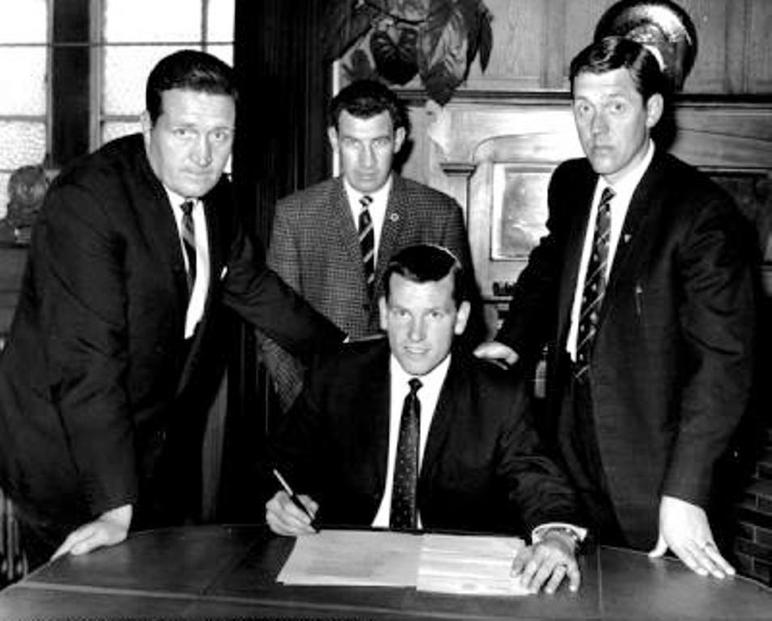
So, with the cup-winning team of 1938 plus Willie Buchan, Jimmy McGrory and Matt Lynch all covered, that leaves just one name on the list, Jack Watters.
His was the only name I didn’t recognise. My loss, as it turned out…
